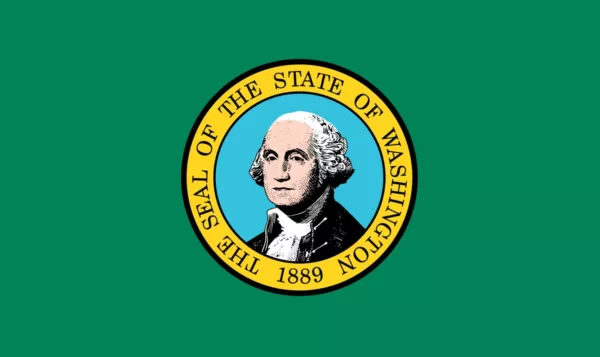
If you’re considering applying for Washington unemployment insurance, you can utilize the Washington Unemployment Calculator to estimate the amount of money you might qualify for in weekly benefits.
Washington Unemployment Benefits Calculator
How are Washington unemployment benefits calculated?
In Washington State, the maximum weekly benefit amount is $1,019.
Your weekly benefit amount is determined using the following formula:
Step 1—Add up the total gross wages from the two highest earning quarters in your base year. Then divide that sum by two.
Step 2—Multiply the result from step 1 by 0.0385.
If the calculated amount is higher than Washington’s maximum weekly benefit amount of $1,019, you will receive $1,019.
If the calculated amount falls between $323 and $1,019, you will receive that specific amount, rounded down to the nearest dollar.
If the calculated amount is less than $323, move to step 3.
Step 3—Calculate your weekly wage by multiplying the amount from step 1 by four and dividing it by 52 weeks.
Step 4—Compare your estimated weekly wage to $323. You will receive the lesser amount, rounded down to the nearest dollar.
For example, if the average of your two highest quarters is $2,800, your weekly benefit amount would be $215. If it’s $30,000, your weekly benefit amount would be $1,019.
How many weeks do I get Washington unemployment benefits?
Unemployed workers in Washington are eligible for up to 26 weeks of benefits or one-third of all gross wages during your base period—whichever number is smaller.
What is a base period?
The base period is used to determine your eligibility for unemployment benefits. It includes the first four of the last five completed calendar quarters before the week you apply for benefits.
Let’s say that you applied for benefits on Jan. 20, 2023. In that case, your base period would include the wages you earned from Oct. 1, 2021, through Sept. 30, 2022.
If you don’t have enough work hours during your base period to qualify for benefits, the department may use an alternate base period to qualify your claim.
Are Extended Benefits available?
Washington does not currently offer Extended Benefits. Extended Benefits are usually only offered when the unemployment rate reaches a certain level. In some cases, they may also be offered after a natural disaster, known as Disaster Unemployment Assistance, or during periods of economic instability, such as during a pandemic.
Can I work part time and receive benefits?
If you are currently working part-time instead of full-time, you may still qualify for partial unemployment insurance benefits.
When you submit your weekly claim, you will need to provide the number of hours you worked and the total amount of money you earned before any deductions.
Even if you are working part-time, you must be ready and available to accept full-time employment. It’s also necessary to actively search for full-time work and keep a record of your job search activities.
How do I get paid?
You have two options for receiving benefit payments:
- You can choose to receive your payments through a prepaid debit card, or
- You can opt for direct deposit into your bank account.
If you apply for UI benefits online using your Secure Access Washington eServices account, you can select a direct deposit or prepaid debit card payment method. If you apply over the phone, you will automatically receive a prepaid debit card in the mail.
If you prefer direct deposit when filing over the phone, the UI claims agent can guide you on how to enter your banking information in your eServices account. For security reasons, phone representatives cannot take your banking details over the phone.
In either case, your unemployment compensation will be deposited electronically, either onto the debit card or into your designated bank account.
What if I filed my weekly claim but didn’t receive payment?
If you don’t receive payment within seven business days of submitting your weekly claim, you will need to get in touch with the Washington Employment Security Department. You can do so by sending them a message through the eServices portal or by calling the UI claims center.
What can be withheld from my benefits?
There are certain circumstances where the Washington Employment Security Department will withhold funds from your unemployment insurance benefits, changing your weekly benefit amount. This includes:
Earnings
Income, such as wages from a part-time job, Workers’ Compensation, severance pay, and certain types of retirement plans, will be deducted from your weekly benefit amount. You will need to report this income on your weekly claim. Failure to do so could result in overpayments or charges of unemployment fraud.
Overpayments
You will need to pay back any benefits you received that you were not entitled to. If you are not able to pay the overpayment all at once and you are still receiving benefits, the department will reduce your weekly benefit amount until the overpayment is repaid.
Child support
If you have child support obligations, the department may need to deduct a portion of your weekly unemployment benefits to fulfill those obligations.
If you have any questions or concerns regarding the amount being withheld, it’s recommended that you reach out to your local Department of Social and Health Services Division of Child Support. They will be able to provide you with the necessary information and assistance.
Income taxes
Unemployment insurance is subject to income taxes. When you submit your initial application for benefits, you have the option to request that 10% of your UI benefits be withheld to pay federal income taxes. If you don’t opt for this, you will need to pay all taxes owed when you file your annual taxes.




